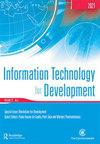The potential of eParticipation in enlarging individual capabilities: a conceptual framework
IF 5.1
3区 管理学
Q1 DEVELOPMENT STUDIES
引用次数: 1
Abstract
ABSTRACT The success of citizens’ electronic participation, or eParticipation, depends not only on mitigating digital divide challenges, but also on facing socio-organizational issues such as citizen data privacy, ICT literacy, as well as citizen awareness and motivation to participate. Despite the efforts of several researchers to present models and frameworks for empirical applications based on the Capability Approach (CA), we found a theoretical gap when searching for scientific work addressing the social aspects of ICT applications; more specifically, how to operationalize eParticipation for good governance through CA. Hence, aiming to investigate the potential of eParticipation initiatives to enlarge individual capabilities, we carried out an in-depth literature review. As a result, we propose a conceptual framework consisting of four propositions that can contribute toward how approach and discuss the role of eParticipation to create new synergies between technology and development, addressing the demands of people, promoting participatory governance, and fostering human development.电子参与在扩大个人能力方面的潜力:一个概念框架
公民电子参与(eParticipation)的成功不仅取决于减轻数字鸿沟挑战,还取决于面对社会组织问题,如公民数据隐私、ICT素养以及公民意识和参与动机。尽管一些研究人员努力提出了基于能力方法(CA)的实证应用模型和框架,但在寻找解决ICT应用的社会方面的科学工作时,我们发现了理论上的差距;更具体地说,如何通过CA实施电子参与以实现良好治理。因此,为了调查电子参与计划扩大个人能力的潜力,我们进行了深入的文献综述。因此,我们提出了一个由四项主张组成的概念框架,这些主张有助于了解和讨论电子参与在技术与发展之间创造新的协同效应、满足人们的需求、促进参与式治理和促进人类发展方面的作用。
本文章由计算机程序翻译,如有差异,请以英文原文为准。
求助全文
约1分钟内获得全文
求助全文
来源期刊

Information Technology for Development
Multiple-
CiteScore
11.30
自引率
16.70%
发文量
34
期刊介绍:
Information Technology for Development , with an established record for publishing quality research and influencing practice, is the first journal to have explicitly addressed global information technology issues and opportunities. It publishes social and technical research on the effects of Information Technology (IT) on economic, social and human development. The objective of the Journal is to provide a forum for policy-makers, practitioners, and academics to discuss strategies and best practices, tools and techniques for ascertaining the effects of IT infrastructures in government, civil societies and the private sector, and theories and frameworks that explain the effects of IT on development. The concept of development relates to social, economic and human outcomes from the implementation of Information and Communication Technology (ICT) tools, technologies, and infrastructures. In addition to being a valuable publication in the field of information systems, Information Technology for Development is also cited in fields such as public administration, economics, and international development and business, and has a particularly large readership in international agencies connected to the Commonwealth Secretariat, United Nations, and World Bank.
 求助内容:
求助内容: 应助结果提醒方式:
应助结果提醒方式:


